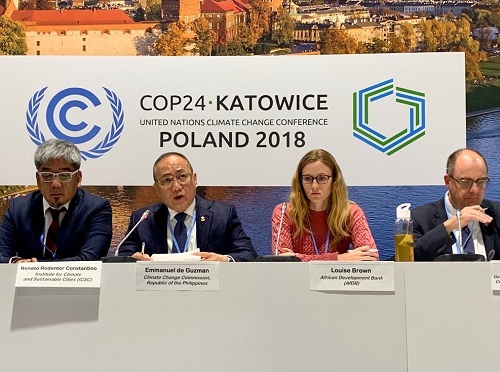
December 12, 2018 Wednesday

KATOWICE, POLAND 12 December 2018 – Climate Change Secretary Emmanuel M. De Guzman presented the country’s People’s Survival Fund (PSF), the country’s flagship climate finance mechanism for adaptation projects, which help local communities undertake domestic action to address climate impacts and support their transition towards a climate-resilient and low-carbon development pathway.
De Guzman, head of the Philippine delegation to the 24th Conference of Parties (COP24) of the United Nations Framework Convention on Climate Change (UNFCCC), delivered the climate adaptation efforts of the country at the side event of the Vulnerable 20 Group of Finance Ministers (V20), organized by the Institute for Climate and Sustainable Cities (ICSC) and the Munich Climate Insurance Initiative.

The Secretary said the PSF, which follows an enhanced direct access modality through a demand-based access process specifically tailored for local government units and local organizations, sets a high ambition of how inclusive climate financing should look like.
“As a climate financing window, I am proud to share with you the innovations unique to the PSF. It strives to respond to specific local adaptation needs by focusing on grassroots-level engagement with local governments and organizations. It is an innovation because it veers away from the conventional top-down planning process from the national government down to local implementers. It shifts the decision-making process of what to ask for and how much to ask to those who are experiencing the situation first-hand,” Secretary De Guzman explained.
He said that the availability of climate funds and opportunities is always an issue in fully undertaking the high ambitions that the country set when the Paris Agreement was signed in 2015.
“We know climate finance is critical and we know it is also limited, in terms of availability and in terms of its inability to cover the more serious impacts, which we call loss and damage. The delivery of climate finance needs to be faster, in greater scale and in more responsive modalities,” De Guzman said.
He said the Philippines started transforming its climate finance landscape when the PSF Law was passed in 2012, as an amendment to the Climate Change Act of 2009, allocating P1 billion for local adaptation projects and providing much needed predictable funds in support of local climate action.
De Guzman added that the Climate Change Commission has been extending technical guidance and support in project proposal design and research in order to ensure that risks and vulnerabilities are articulated well, with the help of delivery partners, including non-government organizations, civil society, and the academe.
He emphasized that the PSF seeks to influence the bureaucratic national budgeting and reporting processes, stating that the PSF Board, which manages the fund, is led by the Department of Finance (DOF), together with other economic agencies and non-government representatives, to fast track the mainstreaming of climate action into the overall development strategy of the Philippines.
“We are looking forward to the PSF getting more experience and hopefully it finds the perfect balance between access and accountability to allow local governments and organizations to contribute more in the resilience building and adaptation efforts of the Philippines,” De Guzman said.
He also noted that the PSF can also serve as a vehicle to channel premium support towards climate risk insurance solutions to help manage the impacts of climate-related disasters, where adaptation and disaster risk reduction aren’t enough, and can be augmented by international sources, such as the Green Climate Fund (GCF).
“Challenges brought about by the impacts of climate change, both rapid and slow onset, are getting worse every day we spend doing nothing. Inaction has its price. Countries should embrace the massive co-benefits of ambitious climate action,” De Guzman said.